US election: When the gloves come off
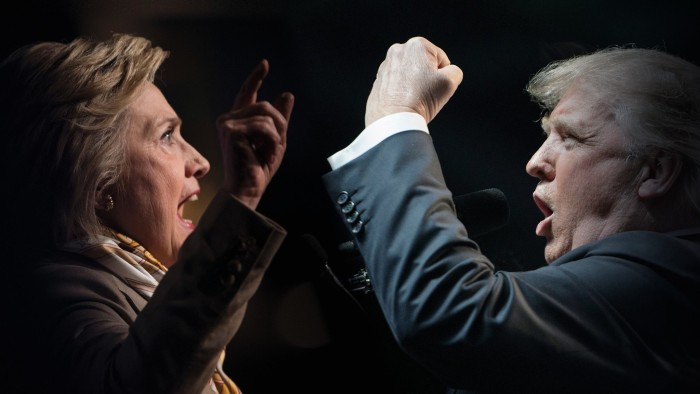
Roula Khalaf, Editor of the FT, selects her favourite stories in this weekly newsletter.
When Hillary Clinton secured the Democratic presidential nomination this week, she took a big step towards breaking the ultimate glass ceiling. But before she can do that, the former first lady, secretary of state and senator will first have to figure out a way to beat Donald Trump, a man whose campaign has confounded politicians, pundits and strategists at every turn.
“Trump started as a joke . . . and our party was smirking. But he is the PT Barnum of politics,” says Byron Dorgan, a former Democratic senator, referring to the 19th century showman famed for noting that a sucker is born every minute. “I originally thought he was like a Roman Candle [firework] on the fourth of July. I was dead wrong.”
Throughout the primary season, the few Democratic elites who gave Mr Trump a chance at winning the Republican nomination consoled themselves with polls that suggested he would be clobbered by Mrs Clinton. But the mood in Washington — and around the world — has shifted as he has risen in the polls.
The Clinton camp had long been confident that Mr Trump’s campaign would eventually crash over his harsh rhetoric about women, disabled people, war heroes, Muslims and Hispanics. But she has taken a more aggressive stance after recognising that it is no longer enough to hope that his divisive campaign will simply implode.
After sealing the nomination by winning the California and New Jersey primaries on Tuesday, Mrs Clinton unloaded on Mr Trump, questioning his suitability for office.
“Donald Trump is temperamentally unfit to be president,” she said. “When Donald Trump says a distinguished judge born in Indiana can’t do his job because of his Mexican heritage, or he mocks a reporter with disabilities, or calls women pigs, it goes against everything we stand for.”
Time for certainties
The new approach comes after weeks in which she seemed unsure about how to go after Mr Trump. Recent polls showing that he posed a stronger-than-expected challenge in the battleground states of Ohio, Pennsylvania and Florida served as a “wake-up call”, says a person close to the Clinton campaign.
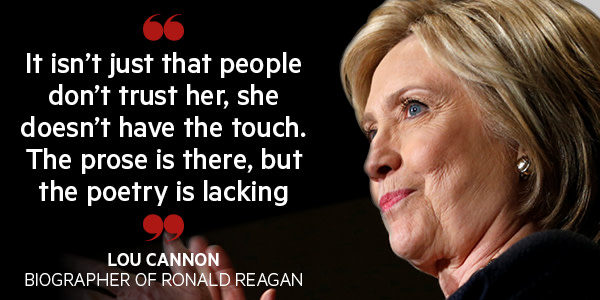
Mrs Clinton will have to solve a problem that eluded Mr Trump’s rivals in the Republican primary: how to land blows on a candidate who seems immune to attacks. For now, she appears to have settled on a position that both questions his temperament to hold the nuclear codes and portrays him as a conman who has preyed on the middle class.
“By any account people underestimated Donald Trump’s potential as a candidate from the very beginning,” says Tom Daschle, the former Democratic Senate majority leader. “I don’t think anyone underestimates Trump any more. Everybody knows that this will be a tough, tough race. It will be one of the ugliest races.”
Joe Trippi, campaign manager for Democrat Howard Dean in 2004, says he has a “healthy respect” for Mr Trump’s unpredictability and ability to dominate the media. But he doubts that Mr Trump’s strategy of lashing out at so many groups will work with the general electorate. “There are all these pundits saying it has worked for him before, it will work for him again,” he says. “I will believe that when I see it, because I don’t see how this strategy works for him in a general election.”
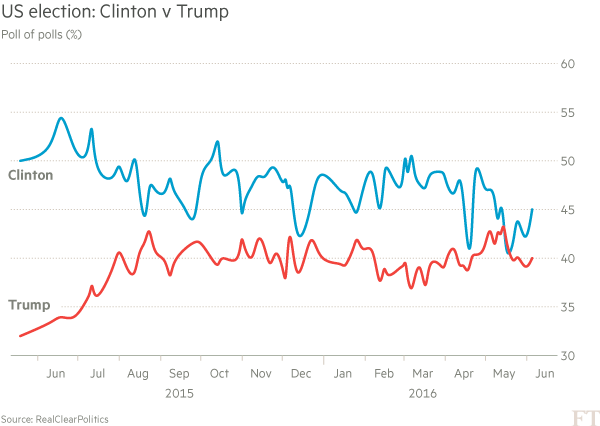
On paper, Mr Trippi should be right. While Mr Trump and Mrs Clinton have the highest-ever unfavourable ratings for presidential nominees, Mrs Clinton performs better with some key groups. She polls much better with women, who made up 53 per cent of voters in 2012, and with African-Americans. She also has higher support among Hispanics, the fastest-growing electoral segment, whom Mr Trump has alienated.
But Mrs Clinton is struggling badly with young voters, who have flocked to Bernie Sanders, the Vermont socialist. On Tuesday, she congratulated Mr Sanders for an “extraordinary campaign” while calling on his supporters to “remember all that unites us”. A recent ABC/Washington Post poll found that 24 per cent of liberals said they would vote for Mr Trump over Mrs Clinton, a rise of 8 points over the past three months. Fifteen per cent of Barack Obama voters from 2012 also expressed a preference for the New York tycoon. On Thursday, the US president endorsed Mrs Clinton and Mr Sanders signalled that he would soon bow out of the contest.
Long before Mr Trump started insulting minorities, Republicans were conscious that demographic trends have complicated their path to 1600 Pennsylvania Avenue. After Mitt Romney lost in 2012, the party concluded that it needed to make efforts to reach out to minorities, particularly Hispanics. Mr Romney fared poorly with Latinos after remarking that they should “self-deport”.
Over the past week, Mr Trump has come under fire for saying that Gonzalo Curiel, the judge presiding over a case related to Trump University, was biased because he has Mexican heritage.
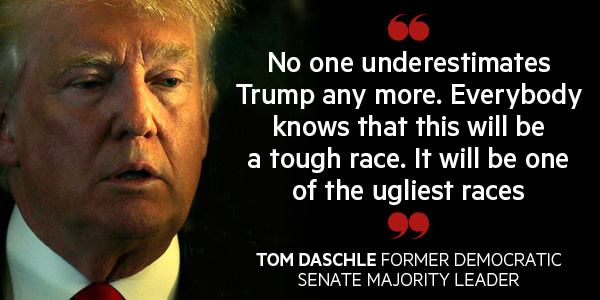
His comments sparked rebukes from top Republicans. House Speaker Paul Ryan described them as “racist” but did not withdraw his endorsement. Other Republicans withdrew their support, including Senator Mark Kirk of Illinois, highlighting concerns that Mr Trump risks dealing a generational blow to the Republicans by repelling minorities. Whites are expected to become a minority by 2045.
‘Momentum campaign’
Some Democrats point out that his racist and misogynist comments have done little to stem his dramatic rise, earning him the moniker “Teflon Don”.
“There are still a lot of people who think that the math doesn’t work for Donald Trump,” says Jamal Simmons, a former Democratic operative who is a political consultant. “On paper they are right, but Trump’s candidacy is not built on paper. It’s built on a big momentum campaign. We don’t know whether it is long-lived or shortlived.”
Mr Trump’s strength has been capturing the frustrations of people who many in the political establishment had lost touch with: white, working-class men whose factory jobs have left the US, and cultural conservatives. Trump supporters say they are frustrated by a lack of economic opportunity and believe that their culture is under threat as gay marriage is legalised and rights are extended to transgender people.
Although Mr Trump flies to his rallies in private jets and revels in a celebrity lifestyle, he has tapped into the populist mood by lambasting politicians, corporate elites and the media. And despite his wealth, he sounds more like the loudmouth at the end of a working-class bar than a polished, robotic politician.
Mo Elleithee, former spokesman for the Democratic National Committee, says Mr Trump has done what politicians should do — listen to voters — while rivals were campaigning on obsolete paradigms. “Nowhere outside of Washington do people live on a ‘left versus right’ spectrum. Today they live on an ‘up versus down’ spectrum,” he says. “His whole argument is the system is rigged and I am going to level the playing field for you.”
Stephanie Cutter, deputy campaign manager for Mr Obama in 2012, says Mrs Clinton would be “very short-sighted” not to take Mr Trump seriously. “Running against Donald Trump is unlike anything any of us have ever done,” she says. “Running against him in a general election will be easier than running in a 16-person Republican primary in that you can consolidate your argument, but at the same time the normal things that stick in a presidential election may not stick.”
One challenge for Mrs Clinton is that Mr Trump is a much better campaigner — a natural performer who perfected his skills on The Apprentice. During one of the Democratic debates, she conceded that she was not a good campaigner, saying: “I am not a natural politician, in case you haven’t noticed, like my husband or President Obama.”
Hard to predict
A person close to the Clinton campaign says his “biggest strength” is unpredictability. He has also demonstrated a willingness to go for the jugular, branding Mrs Clinton “Crooked Hillary” or sometimes “Lyin’, crooked Hillary”. While Bill Clinton thrived on political jousting, Mrs Clinton prefers predictable environments and lacks the “guerrilla warrior” instinct of her husband. “It is a challenge they are aware of,” the person says. “Nobody is going to be surprised in five months’ time saying we didn’t think this through.”
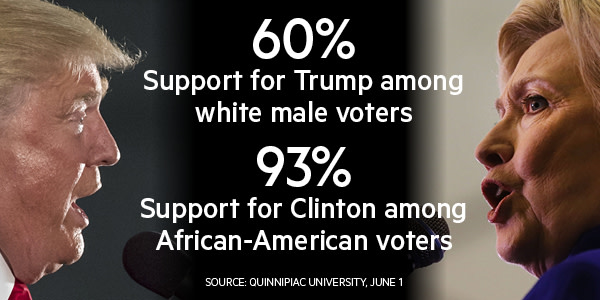
Lou Cannon, a biographer of Ronald Reagan, believes the electoral map will save Mrs Clinton. But he says she will have to work hard to beat Mr Trump since she is a “crummy” candidate. “It isn’t just that people don’t trust her, she doesn’t have the touch,” he says. “The prose is there, but the poetry is lacking.”
Another challenge for Mrs Clinton is that Mr Trump has abandoned core GOP policies, such as free trade. One key question is whether his antitrade stance will help him win states that have not voted Republican in years. Mrs Clinton has already been dragged left on trade to fend off Mr Sanders. She came out in opposition to the Trans-Pacific Partnership agreement despite having described it as the “gold standard” while secretary of state.
One such state is Pennsylvania, where some blame trade deals for the loss of thousands of manufacturing jobs. The rust-belt state has not gone Republican since George HW Bush trounced Michael Dukakis in 1988, and polls show Mrs Clinton with only a very narrow lead over Mr Trump.
Brendan Boyle, a Democratic Congressman from Pennsylvania, says his state will be a “real battleground state” although he expects Mrs Clinton will prevail. He says Mr Trump will benefit from the political divide that has emerged as western and rural Pennsylvania have turned more Republican over the past 20 years. “As DC Democrats have emphasised cultural issues, people have drifted away from the Democratic party,” says Mr Boyle. “Even though Trump is a billionaire and a total phoney, he has gained a unique appeal to this slice of the electorate.”
Another question is whether the Democrats have latent Trump supporters who might abandon the party in November in the same way that the Republicans won in 1980 with the help of “Reagan Democrats”.
One West Virginia exit poll found that 44 per cent of Sanders supporters would vote for Mr Trump over Mrs Clinton — an even bigger margin than other polls because of comments she made dismissing the concerns of coal workers and because some voters associate her with the North American Free Trade Agreement signed by her husband.
While 2016 has been the least predictable presidential race in modern US history, some Democrats are sticking to the faith that voters will ultimately balk at Mr Trump. “People may want to date a wild and crazy person, but ultimately they don’t want to marry them,” says John Breaux, a former Democratic senator from Louisiana.
Mr Dorgan also thinks Mr Trump will fail as “even the biggest bear finds a trap”. But he is also conscious that the mogul has proven everyone wrong over the past year. “It could be an unbelievable landslide [for Mrs Clinton]. On the other hand, that may be wishful thinking,” he says. “I would not be very comfortable with that bet on the house.”
Twitter: @Dimi
Watch our US Election Pub Quiz Video
White House Countdown: Sign up for our free daily US election email
Comments